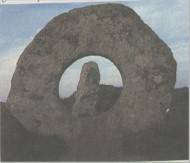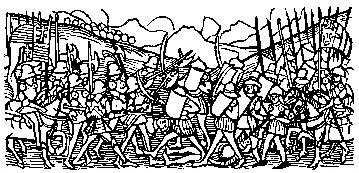|
|
|
|
|
|
|
|
|
The Tale of the Old Warrior and the Young Warrior contrasts knowledge and understanding. The arrogant Young Warrior knows all there is to know about combat, and is sure of his power and expertise. But he does not understand any of these things, because he has never faced defeat; in the end, he does not understand himself, and is out of balance.
The Old Warrior is wiser than his young opponent; wiser, indeed, than all his students, but is not arrogant about it. He knows that age has robbed him of power, dulled his responses, perhaps. But it has brought insight, and restored his balance. He cannot be defeated because he will not make the first move; he responds to real attacks, he is not antagonized into making foolish first strikes.
The Old Warrior's explanation
The Old Warrior answered, "If someone comes to give you a gift and you do not receive it, to whom does the gift belong? If someone comes to you bearing even Death, but you do not receive it, to whom does it belong?"
The Old Woman and the Stone
IN the story of the Old Woman and the Stone, we are given a chance to reflect upon possessiveness -- something that lies at the root of many of the problems which confront the World. The Old Cunning Woman is not obsessed with owning things, with controlling them; what comes into her hand passes easily out of it.
She is not spendthrift; she is not foolish with wealth. What need does she have for the stone, even if it were precious enough to buy a kingdom? Her days are ending; her needs are few. She can recognize the needs of others and, when it lies in her power to do so, she can help them.
Her true treasure is not gems or gold or influence. Her true treasure is the mountains through which she roams, the sky above her, the free-flowing stream, the Moon and the Sun, and the Old Ways to which she holds in her heart.
The Traveller's request
The Traveller returned the stone to the wise woman, and said, "I've been thinking, I know how valuable this stone is, but I give it back in the hope that you can give me something even more precious.
"Give me what you have within you that enabled you to give me this stone."
|

 |
|
The Cunning Man, the King and the Hanged Man
This story seems wonderfully strange, because it is multi-layered, revealing more than one truth to the hearer. On one level, it is a warning not to be deceived by the appearances of things: the apples that beggar bring to the King hide jewels of great worth; the rags of the beggar conceal a Cunning Man of great wisdom and power. We should not be like the King, and be misled by the outward show of things. On another level, the story tells us that to achieve wisdom, one must sometimes undertake to do difficult or unpleasant things. There is no dishonour in that. On yet a third level, the story enjoins us to keep our words, and not say we will do anything unless we mean it. The King, in these unusual circumstances, gives his word, but cannot keep it. He forgets his pledged word, because he allows himself to become confused; but pledged word, like right and wrong, never varies. On a fourth level, the tale enjoins us to keep in mind the big picture; if you seek wisdom, then do not be gulled into rendering your opinion to quickly. Take time to think what you are doing, what you are saying.
The Cunning Man's judgment on the King
Sadly, the Cunning Man told the King, "You have but small wit, because you kept not your promise to me, nor your promise to Angos. You do not even know if your judgment was true or false, nor shall you ever know.
"Your name will not be remembered by generations to come, and, surely, you have learned nothing in your time on Earth." Having finished speaking, the Cunning Man vanished, and was never seen again in that land.
But the King went home, and fell to muttering to himself, neglecting both justice and his arms. So it was not long thereafter that another king brought war to his land, and the King was slain. Thereafter, his kingdom was no more and, as the Cunning Man had told him, his name was not remembered.
Oral Teaching and Oral Wisdom
By means of stories, such as these, Pellors of old passed on law to all seekers of Wisdom. To some these were merely stories, to others, they were the entry point to long study, and profound understanding. The choice is yours, friend, whether you learn much or little. |
 |
|